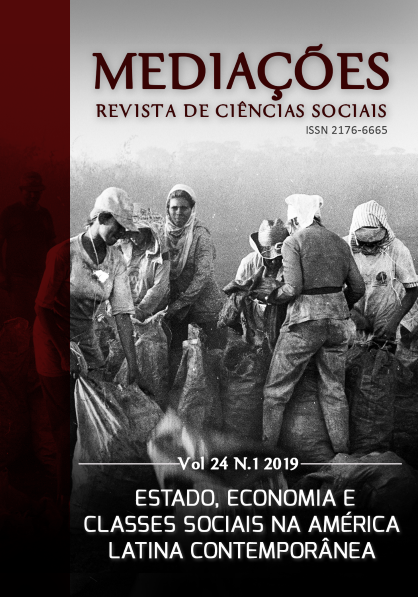The living philology of A. Gramsci
DOI:
https://doi.org/10.5433/2176-6665.2019v24n1p209Keywords:
Methodology, History of political thinking, Antonio Gramsci, Political theoryAbstract
Although he was not a methodologist, having criticized the formulation of a standard method, Antonio Gramsci proposed questions relevant to the study of political theory. It is possible to draw parallels between Gramsci’s formulations and the linguistic contextualism debate of the 1960s, enlivened by the contributions of Q. Skinner. I am referring to the approach of the relations between text and context, developed by contextualists as opposed to the textualistic school of analysis. In this article, I intend to argue that Gramsci can be approached from this tendency with regard to the historical approach of political texts and attention to philological study. However, it was with the formulation of the relationship between history and politics that Gramsci attempted to overcome the abstract and purely hermeneutic perspective of the study of texts, considering that every work of political thought is political and, in this key, must also understand the reception and use of texts in the different contexts in which it is read and interpreted. This leads him to explore the text considering the political disputes and conflicts in which he is mobilized, as well as allowing him to deal with individual works of creation and intellectuals as part of the hegemonic apparatus, capable of delineating or conforming to specific linguistic contexts and according to one pre-established “direction”.Downloads
References
BIANCHI, Alvaro. O laboratório de Gramsci: filosofia, história e política. São Paulo: Alameda, 2008.
BRANDIST, Craig. The cultural and linguistic dimensions of hegemony: aspects of Gramsci’s debt to early Soviet cultural policy. Journal of Romance Studies, v. 12, n. 3, p. 24-43, 2012.
BRANDIST, Craig. The dimensions of hegemony: language, culture and politics in revolutionary Russia. Leiden: Brill, 2015.
CARLUCCI, Alessandro. Gramsci and languages. Leiden: Brill, 2013.
COSTANZA, Orlandi. La riflessione linguistica nei Quaderni del carcere. Lares, v. 73, n.1, p. 55-87, 2007.
COUTINHO, Carlos Nelson; GRAMSCI, Antonio. (org.). Cadernos do cárcere. Rio de Janeiro: Civilização Brasileira, 1999. v. 1.
FEMIA, Joseph V. An historicist critique of "revisionist" methods for studying the history of ideas. In: TULLY, James. Meaning and context: Quentin Skinner and his critics. Princeton, N.J.: Princeton University Press, 1988, p. 113-134.
FEMIA, Joseph V. Gramsci's political thought: hegemony, consciousness, and the revolutionary process. New York: Clarendon Press: Oxford University Press, 1981.
FRANCIONI, Gianni. L’officina gramsciana. Ipotesi sulla struttura dei Quaderni del carcere. Napoli: Bibliopolis, 1984.
GENSINI, Stefano. Linguistics and the political question of language. In: IVES, Peter. ROCCO. Lacorte (ed.) Gramsci, language and translation. United Kingdom: Lexington Books, 2010, p. 63-79.
GRAMSCI, Antonio. Quaderni del carcere. Edizione critica dell’Istituto Gramsci. A cura di Valentino Gerratana. Turim: Giulio Einaudi, 1977.
KOSELLECK, Reinhart. Futures past: on the semantics of historical time. Cambridge, Mass.: The MIT Press, 1985.
KOSELLECK, Reinhart. The practice of conceptual history: timing history, spacing concepts. Stanford: Stanford University Press, 2002.
LO PIPARO, Franco. The linguistic roots of Gramsci’s non-marxism. In: IVES, Peter. ROCCO. Lacorte (ed.) Gramsci, language and translation. United Kingdom: Lexington Books, 2010, p. 19-28.
RAPONE, Leonardo. O jovem Gramsci: cinco anos que parecem séculos. 1914-1919. Rio de Janeiro: Contraponto; Brasília: Fundação Astrogildo Pereira, 2014.
ROSIELO, Luigi. Linguistics and Marxism in the thought of Antonio Gramsci. In: In: IVES, Peter. ROCCO. Lacorte (ed.) Gramsci, language and translation. United Kingdom: Lexington Books, 2010, p. 29-49.
SCHIRRU, Giancarlo. La categoria di egemonia e il pensiero linguistico di Antonio Gramsci. In: D’ORSI, Angelo; CHIAROTTO, Francesca (org.). Egemonie. Napoli: Edizioni Dante & Descartes, 2008.
SCHIRRU, Giancarlo. L’hégémonie de Gramsci entre la sphère politique et la sphère symbolique, Mélanges de l’École française de Rome - Italie et Méditerranée modernes et contemporaines. 2016. Online. Disponível em: http://journals.openedition.org/mefrim/2967. Acesso em: 10 dez. 2017.
SILVA, Ricardo. O contextualismo linguístico na história do pensamento político: Quentin Skinner e o debate metodológico contemporâneo. Dados, 2010, v. 53, n. 2, p. 299-335 .
SKINNER, Quentin. Meaning and Understanding in the History of Ideas. In: TULLY, James. Meaning and context: Quentin Skinner and his critics. Princeton, N.J.: Princeton University Press, 1988, p. 3-53.
WOOD, Neal. The social history of political theory. Political Theory, v. 6, n. 3, p. 345-367, 1978.
Downloads
Published
How to Cite
Issue
Section
License
Copyright on articles published in Mediações belongs to the author(s): in the case of partial or entire republication of the original publication, we ask author(s) to indicate the original publication in the periodical.
Mediações uses the Creative Commons Attribution 4.0 International license, which allows Open Access, enabling any user to read, download, copy and disseminate its content so long as adequately referenced.
The opinions expressed by the author(s) are their sole responsibility.
































